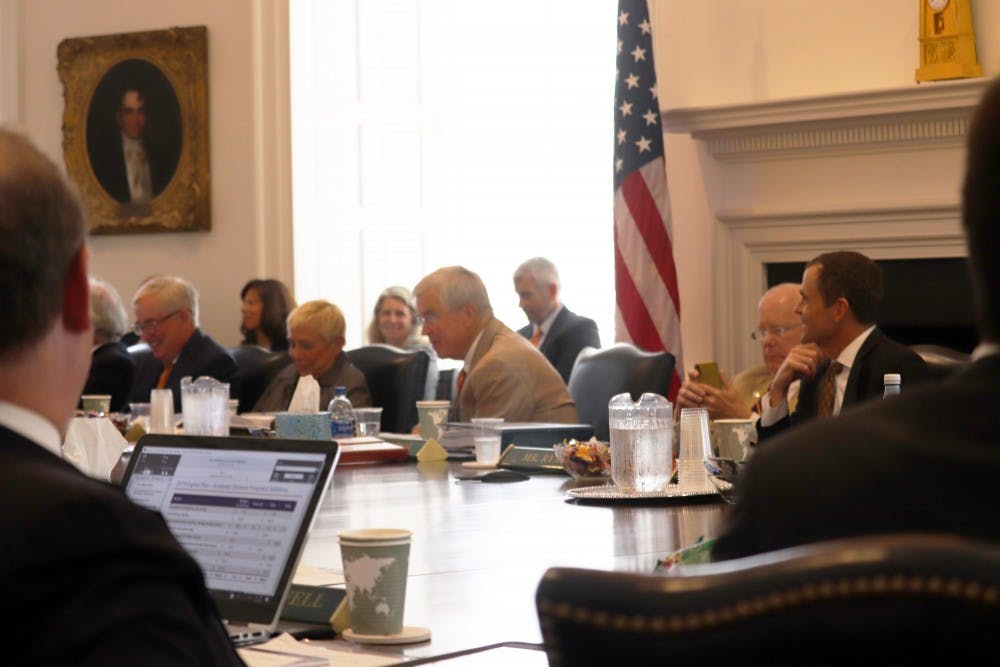The University’s Board of Visitors met Thursday afternoon to approve the establishment of the School of Data Science as well as design schematics for the Inn at Darden and Arboretum. The approving committees, including the Academic and Student Life Committee and the Buildings and Grounds Committee, also discussed the currently offered undergraduate advising and support services.
After receiving a historic $120 million gift from the Quantitative Foundation, University President Jim Ryan formally pledged to establish the School of Data Science in January. According to Ryan’s announcement, the school will offer multiple avenues of education, including doctoral, undergraduate and certificate programs.
At Thursday’s meeting, the BOV committees approved both the establishment of the new school and the school’s concept, site and design guidelines.
As stated in the Academic and Student Life Committee book, the mission of the School of Data Science will be uniquely interdisciplinary. This will include undertaking, “in collaboration with other schools, leading-edge interdisciplinary, open research and catalyze research discovery through shared data and analytical techniques” to serve others in “an increasingly data-driven society.”
The committee book also noted that “no new resources will be requested from the state to establish or sustain the proposed School of Data Science.” Before the new school is official, it will have to be approved by the State Council of Higher Education for Virginia.
The Buildings and Grounds Committee approved the proposed site for the new School of Data Science near the corner of Emmet Street and Ivy Road, occupying “an important and highly visible site in the redeveloped corridor,” according to the committee book. The landscape framework plan depicts the site running largely east / west along Ivy Road, opposing Carr’s Hill Field.
The Buildings and Grounds Committee’s presentation stated that “the proposed site is appropriate for the School’s initial program as well as for future expansion, and allows site visibility and aesthetic character as appropriate for the intended use and for the neighborhood.”
Alice Raucher, the University’s architect, also commented on the benefits of site, stating that it could serve as a central location for discovery on Grounds.
“This prominent site faces the public green with direct visual access to central Grounds, and will also have facades along Ivy Road as well as the internal loop linear green,” Raucher said during the meeting. “I think there’s great alignment between the principal goals of the Emmet/Ivy task force for inclusivity, transparency and visibility and the program for this facility, which can be seen as the anchor for the discovery nexus.”
In addition to approving these aspects of the new School of Data Science, the Buildings and Grounds Committee also approved the schematic design for the Inn at Darden. The design was prepared by architects out of both Atlanta and Richmond in cooperation with the Darden School Foundation, the Office of the Architect for the University and Facilities Management.
The project will feature 198 guestrooms, a restaurant and a lounge on its 198,000 gross square feet, as well as a 6.5 acre arboretum outside. This botanical garden was designed with event spaces, a teaching amphitheatre and connection to the Rivanna Trail.
By approving the design schematics the BOV also approved sections of Sponsors Hall buildings and the Gatehouse, “pending approval by the Art and Architectural Review Board and the Department of Historic Resources,” according to the Building and Grounds Committee book.
The Academic and Student Life Committee also discussed undergraduate advising, touching on both current offerings and challenges the committee is addressing. The committee presented infographics displaying advising and support programs tailored to targeted groups as they experience matriculation and their first few years at the University.
The committee book noted that the College has “the most robust academic advising support structure.” This structure is “serving 11,322 undergraduate advisees in the fall of 2018, 70% of the total 16,156,” according to the committee book. “Each incoming student is assigned both an association dean as well as a faculty advisor.” The association dean advising structure is unique to the College.
In their presentation, the Academic and Student Life Committee noted challenges in programming for different student populations — first generation and transfer students — as well as training peer mentors and communicating effectively. The committee plans to evaluate its success in the future through objective measures such as graduation and retention rates, but also through subjective measures such as “long-term personal and professional success,” according to the presentation.
President Ryan commented on the need for effective communication to students while relaying the list of resources.
“Like a lot of things at the University, I’m surprised every week by what exists,” Ryan said. “The challenge is making it really accessible to students. And I don’t know how to solve that challenge, if there were maybe one website, one landing page, where students know... who can help you the best? It’s an enormous array of resources.”
The Board made no decisions regarding advising Thursday but ended the advising discussion by noting the need for heightened communication with students regarding support systems and other resources.
The establishment of the School of Data Science and Open Grounds at Emmet-Ivy are part of the University’s 10-year strategic plan designed to make U.Va. the best public university in 2030.







